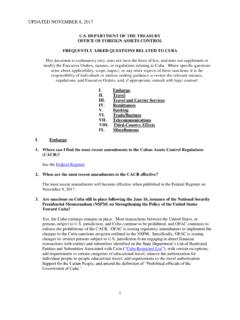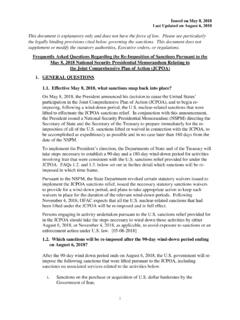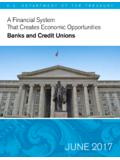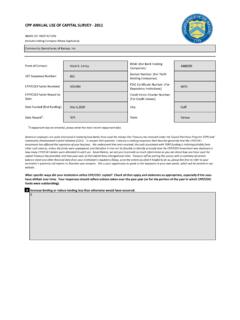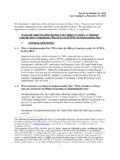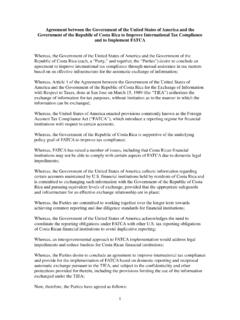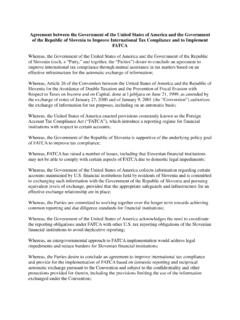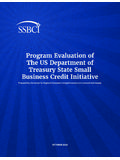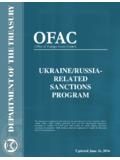Transcription of Frequently Asked Questions: Global Legal Entity Identifier ...
1 1 Frequently Asked Questions: Global Legal Entity Identifier (LEI) August 2012 What is a Global LEI? The LEI is a reference code to uniquely identify a legally distinct Entity that engages in a financial transaction. Currently, there are many ways to identify entities, but there is no unified Global identification system for Legal entities across markets and jurisdictions. The LEI will be a linchpin for financial data the first Global and unique Entity Identifier enabling risk managers and regulators to identify parties to financial transactions instantly and precisely.
2 Currently, an international collaborative effort between public and private entities is developing the LEI, with the support of the Financial Stability Board (FSB) and endorsement of the G-20. Why do we need a Global LEI? The establishment of a Global LEI system will be a significant achievement in responding to the vulnerabilities of the Global financial system and will provide meaningful long-term benefits for both the public and private sectors. When Lehman Brothers collapsed in 2008, financial regulators and private sector managers were unable to assess quickly the extent of market participants exposure to Lehman or to explore quickly and fully how the vast network of market participants were connected to one another.
3 Subsequently, the financial crisis exposed the depth of the problem of identifying financial connections and underscored the long-standing need for a Global system to identify and link data, which will enable financial regulators and firms to better understand the true nature of risk exposures across the financial system. When industry adopts the Global LEI, data reported both externally to supervisors and internally for risk management purposes will be more reliable. The Global LEI will enhance the ability of regulators to monitor and analyze threats to financial stability and the ability of risk managers to evaluate their companies risks.
4 It will facilitate improved micro-prudential and macro-prudential risk analysis, supervision, and regulation; reduce cost for industry in collecting, cleaning, and aggregating data, and in reporting data to government regulators; reduce private firms operational risks and improve their internal risk management; and enhance industry s market discipline. If a Global LEI is so useful, why hasn t it already been established? Private industry has made several attempts over the past 20 years to establish a Global Entity identification system.
5 However, private sector firms and industry associations have been unable to achieve the level of coordination needed to launch a single Global solution. The consistent and coordinated Global commitment by members of the FSB and G-20 to act in the public interest after the worldwide financial crisis has helped overcome previous impediments to developing the LEI. 2 Why did the OFR get involved in establishing the Global LEI and what is the OFR s role? A key element of the OFR s mandate is to improve the quality and scope of financial data by assessing gaps in data standards and helping to fill them for the benefit of market participants, regulators, and research communities.
6 Working to establish a Global LEI system is an essential step in fulfilling that mandate. In November 2010, the OFR issued a policy statement calling for the establishment of an LEI to provide impetus to efforts by regulators and industry. Representatives from the financial industry welcomed the call for development of an LEI and responded with a proposed solution. Since then, government and industry representatives have been working together through the FSB to develop a Global LEI system. Throughout the FSB process, the OFR has played a key role, leading work streams, and working with other regulators and industry to provide recommendations to the G-20 to guide the governance, development, and implementation of a Global LEI system.
7 During the implementation phase, the OFR is serving as a vice-chair on the LEI Implementation Group and will continue to provide leadership and support, working toward the G-20 target of March 2013 for launch of the system. The OFR has worked with other regulators to embed the concept of the LEI into rulemakings, and will continue to do so. These mandatory reporting uses of the LEI will facilitate the rapid deployment of the LEI when the Global system becomes available. How will the LEI system work?
8 The LEI system is an alphanumeric code and associated set of six reference data items to uniquely identify a legally distinct Entity that engages in financial market activities. This Global standard is endorsed by the G-20 and is consistent with the specifications put forward by the International Organization for Standardization (ISO 17442:2012) in May 2012: a 20-digit code and associated business card information. Successful operation of a Global LEI system will require support from the Global regulatory community, private sector firms, and industry associations.
9 Thus, the endorsed recommendations define clear roles for the public and private sectors through a federated model. Regulators will govern through a Regulatory Oversight Committee (ROC); private industry will participate and consult on the development and operations of a Central Operating Unit (COU); and local implementation will be conducted through Local Operating Units (LOU), which will benefit from local knowledge of infrastructure, corporate organizational frameworks, and business practices.
10 The COU will ensure that all parties that implement the LEI adhere to governing principles and standards, including reliability, quality, and uniqueness, that will result in one golden standard for the LEI. 3 Although the FSB recommendations target March 2013 for operation of the Global LEI system, the recommendations allow for some jurisdictions to act as early adopters. Before the full Global LEI system is established, local jurisdictions may move ahead with identification systems, consistent with the Global LEI standard, which will eventually be folded into the Global system.
